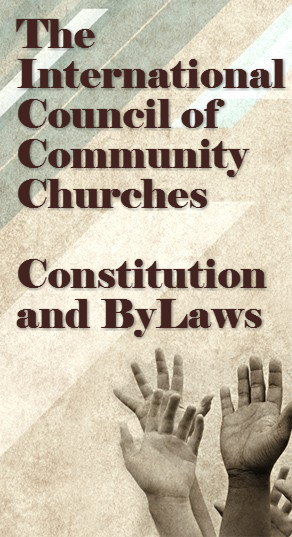Our Mission As people devoted to following Christ we are committed to community, to treasuring diversity, to living our faith in service and love.
Our Vision
To affirm individual freedom of conscience. To protect and promote congregational self-determination. To proclaim that the love of God, which united, can overcome any division.
To be an integral partner in the worldwide ecumenical movement.
|
What Is the International Council of Community Churches? The International Council of Community Churches is a voluntary association of self-governing churches committed to Christian reconciliation and unity.
History:
In 1950, the Biennial Council of the Peoples Church of Christ and Community Centers led by Dr. Joseph M. Evans (until then all Afro-American) and the National Council of Community Churches led by the Rev. Roy A. Burkhardt (until then all Caucasian) joined in a historic merger. At the time, their joining represented the largest interracial merger of religious bodies in America. The new creation was the International Council of Community Churches. Member churches united to be a fellowship of ecumenically minded, freedom-loving congregations cooperating in fulfilling the mission of the Church in the world. As a post-denominational movement, the Council has witnessed and worked for Christian unity, justice and reconciliation in human society. That is the work we consistently carry into the future.
Relationships:
The Council is at its heart relationships among individuals, churches and centers in the service of our common purpose and mission. Through the Council local churches and ministry centers find it possible to find and develop connection with the wider church through the ecumenical movement. In mutual encouragement and resourcing through the Council, local ministries are strengthened.
Operations and Services:
The Council has never had nor will it ever have, a large staff. Currently there are two persons employed by the Council: the Executive Director and the Administrator. The Executive Director functions as “pastor to pastor” and primary point of contact for services to and among churches. The Administrator edits a newsletter (8 times per year) and performs all the office functions related to service to churches. The Council offers much the same array of services to local congregations as traditional denominations. Rather than relying on a large paid staff to do so, the Council encourages peer-to-peer resourcing. Through the Executive Director the Council provides written, electronic and in-person resources to local congregations in pastoral transition and other stressful situations.
Governance:
The Council operates with an “inverted” pyramid of authority. The local congregations own the Council and determine its emphases and operation. They do so by sending delegates to an Annual Conference. Each local church is entitled to two voting delegates, of which both may be laity or one each lay and clergy (but not two clergypersons.) Decisions about Council policy are made by the local church delegates voting in Annual Conference. Delegates elect a volunteer board. The board hires and supervises staff and oversees everyday operations.
Expectations for Member Churches and Ministry Centers:
1. The Council operates by virtue of the participation of local congregations. Every local congregation should seek to send voting and non-voting delegates to Annual Conference, and to participate in regional meetings.
2. Every congregation must participate financially in the Council. The delegates of local churches in Annual Conference have asked each church to provide a minimum of $1,000.00 U.S. dollars as an offering to sustain the work of the Council.
3. Every congregation should seek to share its experience and expertise with other Council churches to the extent practical. See the Council’s website resources section for more information about peer-to-peer resourcing.
4. Every U.S. congregation is invited to enter into a sister church relationship with an overseas congregation. The relationships built through such a relationship can become a vital part of a local congregation’s ministry.
5. Every congregation is encouraged to build relationships with and among Christian churches in its own community. We as a Council exist to work toward Christian reconciliation and unity – beginning with each congregation. Every congregation is further encouraged to build relationships with and among local expressions of other faiths, building understanding, engaging in honest dialogue, and discovering those areas in which persons of a variety of faiths may serve together.
Expectations for the Council:
A church or ministry center should expect that a representative of the Council will be available for consultation about important questions and concerns of the congregation.
A church or ministry center should expect that the Council will provide resources and consultation during times of pastoral transition and at other moments of congregational stress.
A church or ministry center should expect that the Council will provide an array of services to clergy and the churches they serve in order to facilitate their ministries. Among these services are access to a retirement plan for clergy and other church employees; opportunities for fellowship and growth for clergy and laity; scholarships for continuing education for those clergy who are serving smaller churches; and other services promoting the spiritual and numerical growth of churches.
A church or ministry center should expect that the Council will provide documentation of ecclesiastical standing to its clergy; and endorsement services for those of its members who are in or who are seeking to become institutional and/or military chaplains.
A church or ministry center should expect that the Council will provide an opportunity for its congregation to participate in the worldwide ecumenical movement through the Council’s relationships and membership in ecumenical fellowships.
A church or ministry center should expect that the Council will consistently function in keeping with its “inverted pyramid” understanding of inter-church authority, and respond promptly to the expression of concerns or need on the part of member congregations and the clergy who serve them.
A church or ministry center should expect transparency in finances and operations from the Council, with the exception that as “pastor to pastors” the Executive Director will keep confidential those concerns of a pastoral nature brought by pastors and/or members of their congregations.
|



